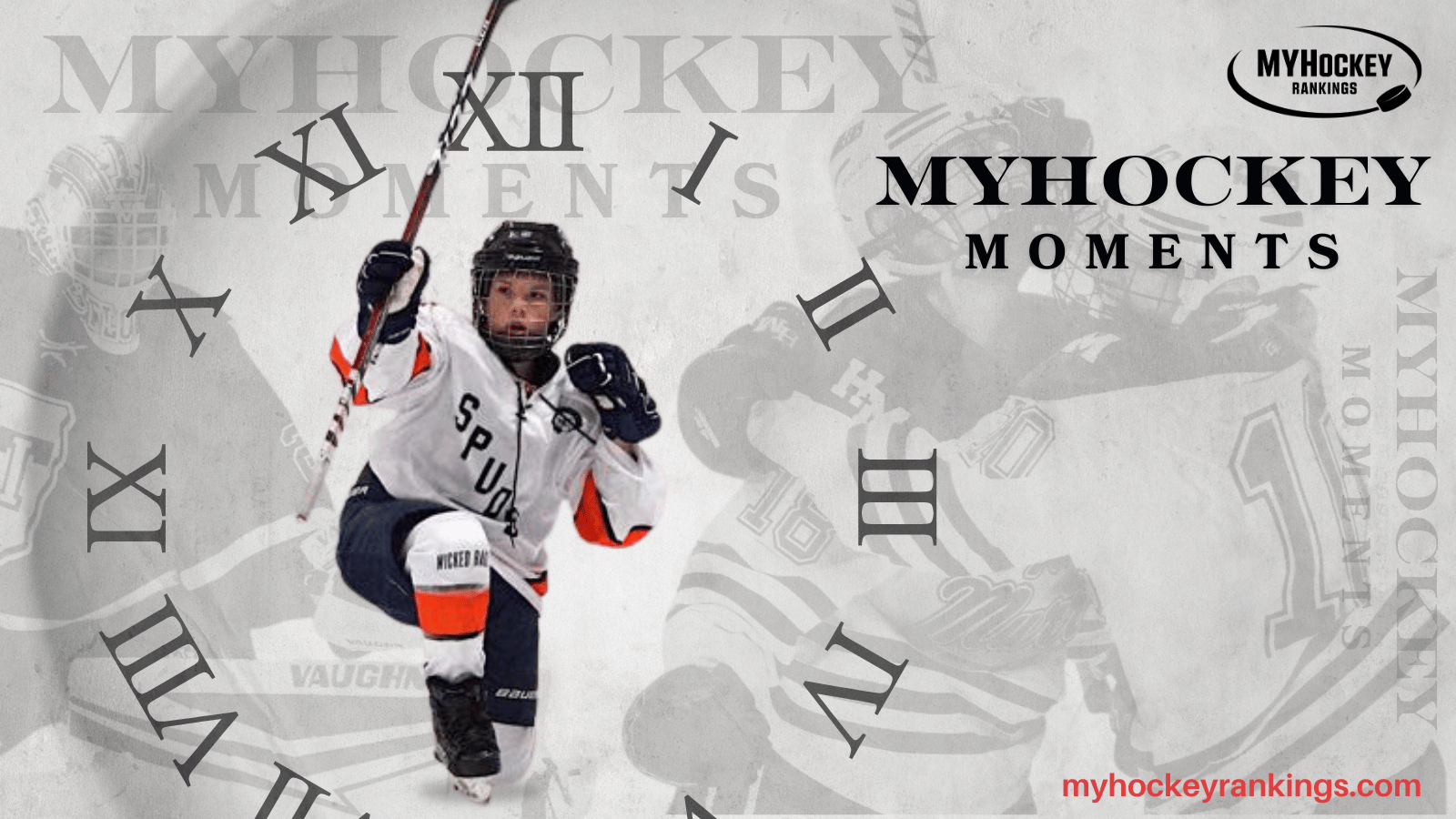
MYHockey Moments: A Little Caring, Concern & Compassion Can Go a Long Way
MYHockey Moments is a series of articles drawing from the author’s experiences working at all levels of sports. The series is intended to provide insight, reflection and teachable moments for coaches, young hockey players and their families. His experience is listed at the end of the article.
By Scott Lowe - MYHockeyRankings.com
The good news is that concern about mental health – and the related issues that can surface among people struggling with their mental health – has become a priority in society today. But the bad news is that there are reasons for that.
For whatever reason – and maybe it’s partially because of the exposure that everything receives in today’s social-media and technology-driven world – mental health issues seem to be more prevalent than ever. Perhaps it’s always been this way and now we just have more knowledge about the causes and ramifications and more ways to spread messages to the masses.
Regardless, mental health concerns often find their way into youth sports. I frequently see issues among players in their teenage years who no longer seem to enjoy playing a game they once loved. At some point between the time that they fell in love with hockey, began taking it seriously and decided that they might want to pursue it to the highest level they can achieve, the fun disappeared.
As we have said many times in this space, it’s very hard for unhappy and stressed-out hockey players to be at the best on the ice. To make things worse, poor performance leads to more unhappiness and frustration, potentially causing a downward spiral that might lead to a player developing a hatred for the game or quitting altogether.
What once was an escape and fun diversion quickly can become one of many factors that can have a negative impact on a young person’s mental health.
There are many factors that can contribute to overarching mental-health issues such as depression, anxiety, anger, frustration and low self-esteem. They key is for the people in a young person’s close circle – family, friends, teachers, coaches, counselors, etc. – to be aware of behavioral changes that could be the result of something very specific and make a point to have a conversation about what they have observed before the behavior carries over to other aspects of someone’s life.
Over time, feelings or behaviors that are not addressed can manifest themselves within a young person and lead to stronger, more concerning feelings of anger, depression and self-loathing that infiltrate many aspects of daily life.
Coaches and family members should strive to have regular conversations with kids who participate in sports, especially those who play at a level that is serious and very competitive. These conversations shouldn’t always be focused on sports, though, and definitely not solely on wins and losses or individual performance.
The goal of the conversations should be to keep them light and allow the athlete to guide the flow instead of influencing them with leading questions or opinions. Perhaps by just asking how a game was and if it was fun or how the player thought practice went before moving on quickly to other topics is a good strategy and would send a subliminal message that there is more to life than a sport.
Still, it’s important to understand that in theory sports participation at some point made the athlete happy, so if he or she is unhappy or frustrated about sports, maybe there is something else going on that needs to be brought to the surface. The goal should be to simply keep a finger on the pulse of how the player is feeling while showing concern and compassion.
Caring and compassion without judgment leads to trust and makes it more likely for a young person to be more open about why he or she is unhappy playing that sport, or even more important, about what else might be contributing to the negative feelings.
Here are two examples from my days as a college administrator that highlight the importance of being in tune with a young athlete’s behavior. We never know what may be going on in someone’s life and how it affects their performance, demeanor and overall mental state.
My first two years out of college I worked with the men’s hockey team at Princeton University. One of the goalies on the men’s hockey team also played baseball. He was a highly touted hockey recruit and split time in goal as a freshman. The player was very consistent and showed flashes that made it appear as if he was destined to be a full-time starter for two or three years.
One Friday night during his sophomore season, the usually unflappable netminder started a game and couldn’t stop a beach ball. He gave up seven goals to a team Princeton would tie, 1-1, later in the season. While the team’s defense was not good that night, the goalie made almost no difficult saves and let a few easy ones through.
After the game I saw the baseball coach, and he asked how the game went and if his player had started. Not wanting to speak poorly of coach’s athlete, I told him the score and said that the defense really struggled.
“When it’s seven goals, you can’t blame the defense,” he said. “It has to be the goalie.”
While he wasn’t entirely wrong, I was a little taken back by the lack of sensitivity or concern in his tone. It wasn’t a big deal, though, just some small talk among co-workers.
It later became public knowledge that earlier in the day the goalie was informed he had not been selected as a member of the eating club he had applied to join. That may sound silly and inconsequential, but the Princeton eating clubs are the center of social activity on campus. They are similar in some ways to fraternities, albeit more refined and regulated.
The clubs are housed in mansions along Prospect Street, just off campus, and are where students go to eat, socialize, study and just hang out. They are privately owned and operated social and dining organizations for second-semester sophomores, juniors, and seniors. According to Google AI, there are 11 clubs that provide “social spaces and community for their members. Six are ‘selective’ and use a process called ‘bicker’ for membership, while five are ‘open’ and use a first-come, first-served sign-in system.”
“Bicker” is similar to pledging or rushing a fraternity or sorority. The process takes place during “Street Week,” and it’s when all the selective clubs make their final membership decisions. The selective clubs are prestigious, with members achieving elevated social status and social opportunities on campus. Those clubs become the hub for the members’ social activity and circle of friends for the remainder of their time at Princeton.
It may seem silly that something called an eating club is such a big deal, but it’s a sign of status and acceptance and incredibly important to the students. When you get turned down, the students say that you “got hosed.” Obviously, that is not flattering, and word spreads quickly across a small campus.
The club the goalie wanted to join was one of the most prestigious on campus and always boasted many athletes among its members. He was crushed by not being accepted, and while people might write off the game as unrelated and say he was just looking for an excuse to explain a poor performance, he clearly was not focused while playing.
A quick conversation between the coach and the players on his team who had just gone through the bicker process might have clued him in to the fact that his goalie was having a very hard time dealing with what happened and prompted the coach hold him out until the next night. Instead, the netminder took the ice in a terrible frame of mind and turned in the worst performance of his career, which only made him feel worse.
Athletics at Ivy League schools are a different than at other NCAA Division I institutions; the academic workload is beyond comprehension, and the pressure to perform in the classroom often exceeds the pressure student-athletes feel in games. Social acceptance and having a social outlet to escape from the daily rigors is important for the mental health of many students. Status is important, too, among most college students.
For this goalie, the blow to his social standing and status among other student-athletes was too much for him to handle in conjunction with the pressure of performing in a Division I hockey game. Better communication might have uncovered this and prevented him being thrust into a situation where he also let his teammates down and felt even worse.
This downward spiral could have been at least halted if the coach had a better understanding of his goalie’s mental state heading into the game. And the goalie’s performance that night had the potential to push him over the edge emotionally and cause him to do something he might have later regretted.
Fortunately, that was not the case.
A few years later, a similar situation played out on a mid-major NCAA Division I basketball team at a school where I was working. The team’s best player was a happy-go-lucky, small and athletic point guard who had been recruited by Big East schools, could jump out of the gym, loved to bomb 3-pointers and always played with a smile on his face.
He would come out of the locker room an hour before the game and walk around the court, saying hello to the athletics staff, asking how they were doing, cutting up and joking with anyone he could find. After games, he would talk to any kids hanging around, sign autographs and even play horse with them or children of staff members occasionally.
The player was the same way on campus; the students loved him and came to games just to watch him. It was impossible to find anyone who would say something negative about him. His coaches used nothing but flattering language when describing him to staff or media, and he was the unquestioned team leader.
During the second half of his senior year the team was struggling, and the coaches suddenly changed their tune. The player’s individual performance also declined, and his playing time began to shrink. Eventually he was removed from the starting lineup and used as a role player.
It was obvious to everyone that something was wrong, but when questioned by staff members the player just put on a happy face and pretended everything was fine.
His coaches, on the other hand, turned their backs on him instead of trying to figure out what he might be dealing with. Instead, when questioned about his playing time, they simply said, “He’s become a real {jerk}.”
A stronger word than “jerk” was used, but this is a family show.
As it turns out, the player came from a very rough area and there were a lot of family issues going on at home that he didn’t want to share openly with people he didn’t know well. The coaches, who recruited him and with whom he had the closest relationship of anyone on campus, washed their hands on the situation and gave up on him instead of showing any concern or trying to figure out what might have caused the abrupt personality change.
As his playing time decreased, his attitude got worse around the team and his academic performance – which had always been good – plummeted. The downward spiral continued in all aspects of his life until he ultimately was expelled from the institution for poor academic performance.
He left the program as the all-time leader in 3-pointers made, was second in career assists and set the single-season steals record.
Many of us were concerned for his well-being since we knew what he was going back to and how much the opportunity at the school had meant to him. His life was at a crossroads and could have taken a very bad turn at that point, but fortunately he was able to find an agent who took an interest in him and went on to have a successful 15-year professional career abroad.
Thankfully, that situation worked out, but it could have ended very badly for a young man who had so much to give and so much time left to continue impacting the world positively with his bright smile and basketball talent.
It’s possible that everything could have turned out even better, though, if the coaches had shown a little compassion. Perhaps he would have turned things around personally and helped the team win more games while earning a college degree as one of the most decorated players in school history.
A simple conversation and display of concern and compassion from his coaches might have been all that was needed. Many kids can turn to their parents in situations like this, but this young man couldn’t.
The role of parents and coaches in helping young athletes navigate their lives during today’s turbulent and uncertain times never can be underestimated. Sports can be a great escape and should be something fun that provides a release from the stress of everyday life for the young people who participate.
If an athlete who at one time loved the sport and looked forward to playing it more than anything in the world suddenly seems withdrawn, unhappy, frustrated or angry, take a minute to check in and make sure everything is okay. There might be something bubbling under the surface that could lead that young person into a devastating downward spiral if it isn’t uncovered.
A simple display of compassion or even a benign question like, “Hey, how are you doing today? You don’t seem like yourself lately,” might be all it takes to turn someone’s day, week, month or life around and start them on a positive path going forward.
Scott Lowe currently runs a program called DMV Prospects in Maryland that advocates and provides exposure and college counseling for hockey players in that area who hope to play beyond youth and high school hockey.
He coached various sports, including hockey, at multiple levels for nearly 30 years and spent 15 years working in athletic departments at the NCAA Division I level. His daughter played lacrosse and was captain for a nationally ranked NCAA Division III program, and his son was a two-time captain who played more than 100 career NCAA Division III hockey games.

